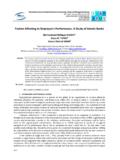Transcription of White PaPer Seven Success Factors for Coaching …
1 White PaPer - Seven Success Factors for Coaching Programs that Get ResultsBy Brian Gast, President of Quadrant Corpw h i t e p a p e r Se v e n Su c c eS S Fa c t o rS F o r co a c h i n g pr o g r a mS t h a t ge t re S u l tS Executive SummaryModern CEOs are facing more pressure from conflicting sources now than ever before. Top organizations realize their leaders not only need a resume with strong education and work experience but also a great degree of maturity and self-awareness to put their knowledge and skills to good use. As a result, more and more organizations are investing in Coaching programs. In fact, annual spending on Coaching in the United States is estimated at roughly $1 billion. But the benchmarks defining Coaching excellence are still unproven. Corporate clients are reporting frustration with tracking the return on their Coaching dollar.
2 In many cases they are wasting their money on programs that yield surface-level results and expecting behavioral changes that are unsustainable. This is happening because most executive Coaching today is focused on superficial skills-training rather than on facilitating fundamental shifts in a leader s self-concept and belief system. Executives and HR professionals who want to hire a coach need criteria on which to evaluate and identify good Coaching programs. This whitepaper outlines Seven must-have Factors for a successful Coaching engagement. To be a CEO today in a top company requires an incredible amount of emotional maturity. A series of interviews with leading UK headhunters has revealed that rather than being a boss, the modern CEO must be an engaging leader 1 who has the trust and ability to inspire groups of very talented people, most of whom consider themselves leaders and don t want to be led.
3 2 Not only must CEOs have the people skills to handle a savvy pool of internal employees, they must also win the trust of a wide array of external clients and stakeholders. The revolution in communications technologies and the globalization of the marketplace demand CEOs navigate and respond to increasing and often conflicting pressures. 3 Top organizations realize they have to look beyond a strong resume with a Stanford BA, a Harvard MBA and blue-chip work experience to ask How do we know this person has the maturity and self-awareness to put all this knowledge and experience to good use? 1 StrategyOne, DNA of Leadership, Orange Future Enterprise Coalition Forum, 14 November 2007, Orange Business Services; accessed 18 June 2008, < >.2 Rob Goffee and Gareth Jones, Leading Clever People, Harvard Business Review, March 2007: Harvard Business Publishing, accessed 18 June 2008, < >.
4 3 StrategyOne, op. cit. 2w h i t e p a p e r Se v e n Su c c eS S Fa c t o rS F o r co a c h i n g pr o g r a mS t h a t ge t re S u l tS To ensure business leaders deliver their personal best, many of the world s most admired corporations, from General Electric to Goldman Sachs, now invest in executive Coaching . In fact, annual spending on Coaching in the United States is estimated at roughly $1 billion. 4 Yet in spite of this large investment in Coaching , as Stratford Sherman and Alyssa Freas say in their overview of today s Coaching environment, The essentially human nature of Coaching is what makes it work and also what makes it nearly impossible to quantify. 5In a 2003 survey of research on Coaching , Dr. Anthony M. Grant at the University of Sydney, Australia, found only 131 peer-reviewed studies about executive Coaching published since 1937.
5 Of these, 56 were empirical and the majority of those were uncontrolled group or case studies. 6 The research is still in its infancy so the benchmarks of what makes a good executive coach are as yet unproven. As a result, barriers to entry into the Coaching field are nonexistent 7 and self-styled coaches are coming into the profession from all different backgrounds. Many lack the personal depth to take their clients to deeper levels of change and growth. Corporate clients continue to invest in Coaching , but many report frustration with superficial programs that demand unsustainable behavior changes. Clients are also frustrated with their inability to track the return on their Coaching dollars. Instead of fostering personal transformation, most Coaching programs teach executives new ways to direct other people. Executives have such a strong focus on outside Factors their company s stakeholders, employees and customers they often miss the beliefs and dynamics going on inside themselves and how those beliefs influence their external world.
6 It is true for everyone that what happens for us internally will, at some point and in some form, show up externally. When we look internally, we find the blocks, resistance, or that internal voice that says No. If we don t smooth out those inner knots we will transmit the confusion and pain they create to the external world. As we work out the knots we often tap into more clarity, connection and creativity. To be truly effective, a Coaching program must give executives an objective look at themselves and how their perceptions of the workplace and the people in it affect their results. This White PaPer is intended to help company executives and HR professionals evaluate prospective Coaching programs by presenting Seven must-have Factors for Coaching Stratford Sherman and Alyssa Freas, The Wild West of Executive Coaching , Harvard Business Review, November 2004: Harvard Business Publishing, accessed 18 June 2008 < >.
7 5 Ibid. 6 Anthony M. Grant and Richard Zackon, Executive, Workplace and Life Coaching : Findings from a Large-Scale Survey of Inter- national Coach Federation Members, International Journal of Evidence Based Coaching and Mentoring, Vol. 2, No. 2, August 2004, Oxford Brookes University, accessed 18 June 2008, < >. 7 Stratford Sherman and Alyssa Freas, The Wild West of Executive Coaching , Harvard Business Review, November 2004: Harvard Business Publishing, accessed 18 June 2008 < >.3w h i t e p a p e r Se v e n Su c c eS S Fa c t o rS F o r co a c h i n g pr o g r a mS t h a t ge t re S u l tS 4 Success Factor #1: Effective Coaches Inspire Transformational not Transactional Change Most current Coaching models do not facilitate fundamental shifts of consciousness in leaders. James Flaherty, founder of the New Ventures West coach-training firm, says most corporate Coaching is transactional rather than transformational.
8 Transactional Coaching provides skill development, awareness of behavior and associated behavior modification. But these benefits are superficial. The deeper work of transformational Coaching involves changes in a person s belief systems, changes in the way they make meaning from events, and changes in their self-concept. Rather than training people to simply act differently, an effective Coaching program focuses on changing their perceptions. Successful Coaching shines a light on the shadow sides of the leader the parts of their own behavior they do not see or understand but that have a powerful impact on their leadership effectiveness. In this way, a truly effective Coaching program helps increase a leader s maturity level so they make authentic choices that create more sustainable, lasting h i t e p a p e r Se v e n Su c c eS S Fa c t o rS F o r co a c h i n g pr o g r a mS t h a t ge t re S u l tS5 Success Factor #2: Effective Coaches Establish Trust Effective Coaching is transformational and involves processes that change the way people perceive themselves and others.
9 Building trust with clients is critical in allowing them to access and expose their inner lives that level of consciousness that drives their belief systems. Trust should not be confused with credibility although the two are related. A coach s background, education, and client list all help build credibility, but not necessarily trust. Credibility is important to the process of selecting and initially connecting with a coach but it quickly gives way to the real question, Can this person help me get to the next level of effectiveness? Trust is not about content, for example, a resume. Trust is about a process, for example, a coach s willingness to be vulnerable and direct. Trust is not about some unspoken agreement that the coach is going to be gentle or nice. Trust exists because everyone is committed to using the Coaching tools and processes to get to the deeper trusting relationship is not magic.
10 It is a result of the personal growth work done by effective coaches. The work they ve done and the self-discoveries they ve made give them the self-mastery and confidence to navigate clients across their own inner trust also involves defining the relationship the coach has with the coachee and the coachee s upper management. We see too many coaches mistrusted from the outset because they have aligned themselves too closely with the upper management. It is critical to structure the confidentiality of an engagement to prohibit the feeding back of any details from a Coaching session to a boss. This is done by focusing reports exclusively on the executive s growth and progress toward their goals. Success Factor #3: Effective Coaches Take TimeAn effective Coaching program is spread over a period of time and tackles live issues facing a client. Meetings can be in person or over the phone in combination with less frequent face-to-face meetings.






